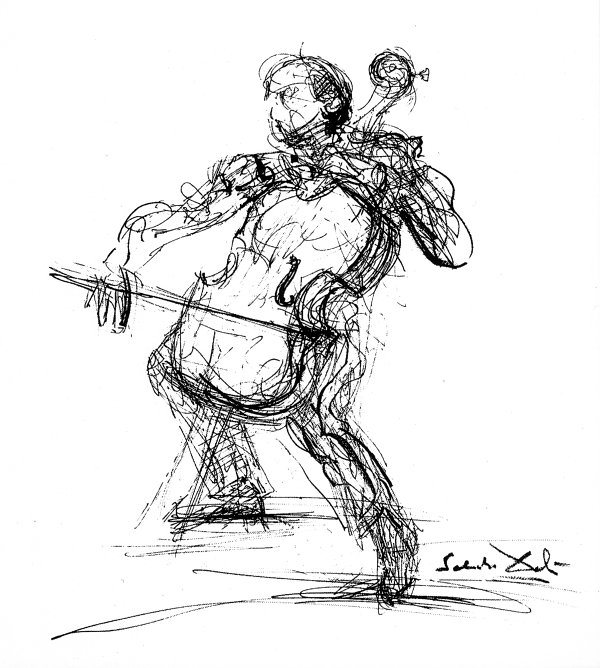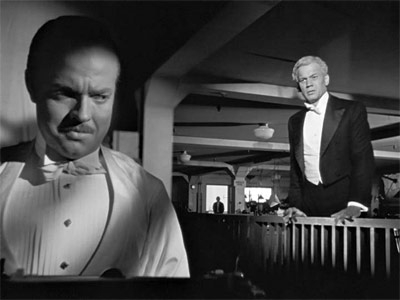I report on two satisfying shows in this week’s Wall Street Journal drama column, Million Dollar Quartet and Keen Company’s off-Broadway revival of I Never Sang for My Father. Here’s an excerpt.
* * *
Good clean rockabilly fun has come to Broadway in the form of “Million Dollar Quartet,” an unpretentious, engagingly energetic staged concert with just enough story to qualify it as a jukebox musical. The subject is the celebrated evening in 1956 when Johnny Cash, Jerry Lee Lewis, Carl Perkins and Elvis Presley got together at Sam Phillips’ recording studio in Memphis for an informal pre-Christmas jam session. These pop-music giants are respectively portrayed by Lance Guest, Levi Kreis, Robert Britton Lyons and Eddie Clendening, four accomplished musicians who evoke their legendary models without stooping to literal imitation. Put them together and you get a hell of a band….
Don’t go to “Million Dollar Quartet” looking for great acting. Three members of the front line are not professional actors (Mr. Guest is the ringer) and the book, by Colin Escott and Floyd Mutrux, is tissue-thin. This is the kind of show that goes flat whenever the characters stop singing and start talking. Fortunately, they do plenty of the former and not too terribly much of the latter….
How good must a play be to make it worth seeing? It certainly needn’t be a masterpiece. Robert Anderson’s “I Never Sang for My Father,” which had a modest but respectable run on Broadway in 1968 and was then turned into a modestly successful film, is a post-“Glass Menagerie” kitchen-sink drama about an aging father (Keir Dullea) and his angry, alienated son (Matt Servitto). Though devoid of poetry, it’s so true to life that you’ll wince at every other line, and Keen Company’s revival is as satisfying as a meat-and-potatoes dinner whipped up by a five-star chef….
* * *
Read the whole thing here.
Archives for 2010
TT: Shakespeare denial
 I’m one of many people who’s read and been impressed by James Shapiro’s Contested Will: Who Wrote Shakespeare? In tomorrow’s Wall Street Journal “Sightings” column I talk about the book, and the phenomenon that inspired it. I was inspired in turn by something that struck me while reading Contested Will, though Shapiro himself didn’t get around to mentioning it: Shakespeare is, so far as I know, the only major artist since Homer whose authorship of the works for which he is remembered has been systematically questioned. Why? Why the Bard and not, say, Bach?
I’m one of many people who’s read and been impressed by James Shapiro’s Contested Will: Who Wrote Shakespeare? In tomorrow’s Wall Street Journal “Sightings” column I talk about the book, and the phenomenon that inspired it. I was inspired in turn by something that struck me while reading Contested Will, though Shapiro himself didn’t get around to mentioning it: Shakespeare is, so far as I know, the only major artist since Homer whose authorship of the works for which he is remembered has been systematically questioned. Why? Why the Bard and not, say, Bach?
If that question piques your curiosity, pick up a copy of Saturday’s Journal and see what I have to say.
UPDATE: Read the whole thing here.
TT: Almanac
“Selfishness must always be forgiven, you know, because there is no hope of a cure.”
Jane Austen, Mansfield Park
TT: Just because
Vladimir Horowitz plays the slow movement of Mozart’s A Major Piano Concerto, K. 488:
Is there a more beautiful piece of music in all the world?
TT: Pick-me-up
A reader writes:
I’ve been reading Pops with tremendous pleasure–it was the ideal book to take with me on a recent trip to New Orleans for the French Quarter Festival. A parking attendant saw me there carrying it one day and shouted out, “Good book!”
That might just be the best review I’ve ever gotten.
TT: So you want to see a show?
Here’s my list of recommended Broadway, off-Broadway, and out-of-town shows, updated weekly. In all cases, I gave these shows favorable reviews (if sometimes qualifiedly so) in The Wall Street Journal when they opened. For more information, click on the title.
Warning: Broadway shows marked with an asterisk were sold out, or nearly so, last week.
BROADWAY:
• A Behanding in Spokane (black comedy, PG-13, violence and adult subject matter, closes June 6, reviewed here)
• Fela! (musical, PG-13, adult subject matter, reviewed here)
• God of Carnage (serious comedy, PG-13, adult subject matter, reviewed here)
• South Pacific (musical, G/PG-13, some sexual content, brilliantly staged but unsuitable for viewers acutely allergic to preachiness, closes Aug. 22, reviewed here)
OFF BROADWAY:
• Alfred Hitchcock’s The 39 Steps (comedy, G, suitable for bright children, original Broadway production reviewed here)
• Avenue Q (musical, R, adult subject matter and one show-stopping scene of puppet-on-puppet sex, reviewed here)
• The Fantasticks (musical, G, suitable for children capable of enjoying a love story, reviewed here)
• The Glass Menagerie (drama, G, too dark for children, extended through June 13, reviewed here)
• Our Town (drama, G, suitable for mature children, reviewed here)
• The Temperamentals (drama, PG-13, adult subject matter, reviewed here)
CLOSING SOON OFF BROADWAY:
• The Orphans’ Home Cycle, Parts 1, 2, and 3 (drama, G/PG-13, too complicated for children, now being performed in rotating repertory, closes May 8, reviewed here, here, and here)
CLOSING SATURDAY OFF BROADWAY:
• The Cocktail Party (drama, PG-13, adult subject matter, reviewed here)
TT: Almanac
“Be sure to read no mean books. Shun the spawn of the press on the gossip of the hour. Do not read what you shall learn, without asking, in the street and the train.”
Ralph Waldo Emerson, “Books”
TT: Justified
Howard Kurtz, who covers the media for the Washington Post, quoted me on Monday in a column about the changing role of newspaper critics in the age of online opinion, professional and otherwise. Since what I said to Kurtz got noticed here and there, it occurred to me that it might be worth reprinting part of a column I wrote for The Wall Street Journal in 2007 in which I addressed the same topic at greater length.
* * *
I now spend more time reading art-related blog postings than print-media reviews. Increasingly, they’re sharper, livelier and timelier than their old-media competition.
This is why I have mixed feelings about the decline of regional newspaper criticism, much of which is uneven in quality and not a little of which is pointless. Why, for instance, should a medium-sized newspaper run locally written reviews of blockbuster movies or beach-blanket novels? That’s like assigning a restaurant critic to discuss the difference between Big Macs and Whoppers. To the limited extent that such commodity art requires “serious” criticism, wire-service copy will do the job perfectly well.
 The fine arts, however, are a different story. One of the most important civic duties that a newspaper performs is to cover the activities of local arts groups–but it can’t do that effectively without also employing knowledgeable critics who are competent to evaluate the work of those groups. Mere reportage, while essential, is only the first step. It’s not enough to announce that the Hooterville Art Museum finally bought itself a Picasso. You also need a staffer who can tell you whether it’s worth hanging, just as you need someone who knows whether the Hooterville Repertory Company’s production of Private Lives was funny for the right reasons.
The fine arts, however, are a different story. One of the most important civic duties that a newspaper performs is to cover the activities of local arts groups–but it can’t do that effectively without also employing knowledgeable critics who are competent to evaluate the work of those groups. Mere reportage, while essential, is only the first step. It’s not enough to announce that the Hooterville Art Museum finally bought itself a Picasso. You also need a staffer who can tell you whether it’s worth hanging, just as you need someone who knows whether the Hooterville Repertory Company’s production of Private Lives was funny for the right reasons.
Can bloggers do that? Of course–and some of them do it better than their print-media counterparts….
But blogging, valuable though it can be, is no substitute for the day-to-day attention of a newspaper whose editors seek out experts, hire them on a full-time basis, and give them enough space to cover their beats adequately. The problem is that fewer and fewer newspapers seem willing to do that in any consistent way. I don’t care for the word “provincial,” but I can’t think of a more accurate way to describe a city whose local paper is unwilling to make that kind of commitment to the fine arts.
To be sure, it’s hard for medium-sized regional newspapers to attract serious critics, but it can be done. Indeed, a well-edited regional paper is often the best possible place for an up-and-coming young critic to learn his trade. I got my start reviewing second-string classical concerts for the Kansas City Star thirty years ago. Now that such entry-level work is drying up, I fear for the future of arts journalism in America.
Any artist who’s been side-swiped by a lame-brained critic will doubtless be tempted to cheer this news. Before such aggrieved folk break out the Dom Perignon, though, they should pay heed to the warning of Virgil Thomson, who dominated American music criticism in the Forties and Fifties: “Perhaps criticism is useless. Certainly it is often inefficient. But it is the only antidote we have to paid publicity.”
If you think you can do without that antidote, more power to you–but you’d better be prepared to buy a lot of ads.
